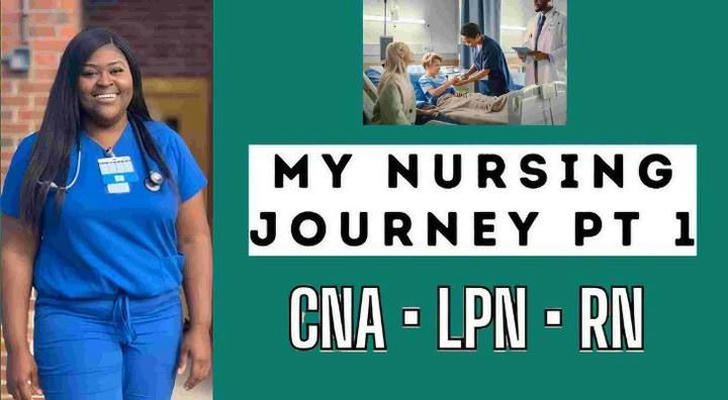🌟 CNA → LPN Online Bridge Program: Accelerate Your Nursing Career 🌟
👩⚕️ Why Choose the CNA → LPN Pathway?
💰 Salary Comparison: CNA average annual salary is around $39,000; LPN exceeds $60,000
🏥 Employment Options: Hospitals, long-term care facilities, rehabilitation centers, home health care
📈 Career Growth: LPN is a key step toward RN, BSN, or higher degrees
🔹 Tip: This is the ideal time to increase your income and broaden your career prospects!

🎓 Program Advantages
LPN bridge programs typically combine theoretical learning with clinical practice to build a strong foundation.
✅ Flexible Learning Mode — Online courses combined with local clinical practice, suitable for working CNAs
✅ Clinical Training Experience — Complete hands-on practice at local facilities
✅ Manageable Learning Duration — Full-time: 6–12 months; part-time: up to 24 months
✅ Accreditation Guarantee — Meets state nursing board and ACEN requirements, eligible for NCLEX-PN
Next, take some schools offering online or hybrid bridge programs to help you compare options.
🏫 CNA → LPN Online/Hybrid Bridge Program School Comparison
The table below summarizes a few schools offering online or hybrid bridge programs, so you can quickly compare learning modes, tuition, accreditation, and program highlights:
| School | Learning Mode | Duration | Tuition | Accreditation / Eligibility | Program Highlights |
|---|---|---|---|---|---|
| Herzing University | Online + Local Clinical | ~12 months | $430/credit (overall cost relatively high) | ACEN-accredited, eligible for NCLEX-PN | Intensive schedule, suitable for working students; covers full theory & clinical skills |
| University of Hawaiʻi Maui College | Hybrid (Online + On-site Training) | Not specified | Not specified (financial aid available) | State-approved, prepares for PN role | Collaborates with local healthcare employers, supports prerequisite courses, highly flexible |
| Community College of Rhode Island | Hybrid | ~12 months | Not specified | State-approved, LPN knowledge & skills | Emphasizes academic preparation & continuity; combines theory + practice; steady-paced |
🔹 Tip: When choosing a program, consider tuition, duration, accreditation, clinical practice arrangements, and whether it suits your work schedule for successful completion and LPN eligibility.
🔎 Online vs Traditional Program Comparison
| Aspect | Online 💻 | Traditional 🏫 |
|---|---|---|
| Learning Flexibility | ✔️ Learn anytime, anywhere; ideal for working professionals | ❌ Fixed schedule & location; must attend campus |
| Clinical Practice | ✔️ Complete at local facility or current workplace | ✔️ Scheduled at school-affiliated hospital or nursing center |
| Pace | ✔️ Self-paced; full-time or part-time | ❌ Follows class schedule |
| Cost | 💲 Generally lower; saves transportation & housing | 💲💲 Tuition may be higher; extra expenses |
| Interaction | 💬 Virtual classroom + discussion boards | 👥 Frequent face-to-face interaction |
| Tech Requirements | 📱 Laptop/tablet + internet needed | 📝 No extra devices required |
🔹 Summary Tip:
- Online 💻 → Better for working students balancing job and study
- Traditional 🏫 → Better for those who prefer face-to-face interaction and a fixed schedule

📘 Course Content
🧬 Anatomy & Physiology
💊 Pharmacology & Medication Management
🏥 Clinical Nursing Skills & Procedures
🍎 Nutrition & Health Promotion
🗣️ Medical Terminology & Communication
⚖️ Nursing Ethics & Professional Standards
🔹 Tip: Completing the program equips you with solid knowledge and skills to confidently take the NCLEX-PN exam.
💰 Tuition & Funding
- Tuition Range: Approx. $5,000 – $15,000 (varies by school and program)
🔹 Funding Tips:
- Federal aid (FAFSA, Pell Grant)
- Scholarships
- Employer tuition assistance
- Flexible payment plans With funding in place, you can assess whether enrollment fits your personal situation.
✅ Who This Program Is For
- CNAs planning to advance their career
- Nurses seeking higher pay and broader opportunities
- Working professionals needing flexible study options
- Learners aiming to continue to RN/BSN in the future
🔹 Tip: If you fall into any of these categories, this pathway is highly suitable for you.
📌 Age & Suitable Groups
👩🎓 Ages 18–25
Meet the minimum age requirement (18) and enter the nursing field in just 12–18 months. Faster career start compared to a four-year degree.
👨 Ages 25–45
Ideal for those seeking career advancement or a change. Many programs are offered in online/hybrid formats, providing flexibility to study while working.
👩🦳 Ages 45–65
Perfect for a second career. Many schools offer tuition assistance and flexible schedules, making it easier to balance study and life experience becomes an advantage.
🧓 65 and above
Some older adults also choose to pursue this path to stay active and contribute to the community, especially in elder care roles.

🚀 Career Pathway
CNA → LPN → RN/BSN → MSN
🔹 Tip: Progress step by step from entry-level nursing roles to advanced positions, opening broader opportunities in the healthcare field.
🔑 Take Action Now
📈 The demand for nurses continues to rise, and LPN is projected to be one of the fastest-growing nursing professions over the next decade.
🔹 Tip: Now is the perfect time to enhance your skills, increase your income, and expand your career potential!
